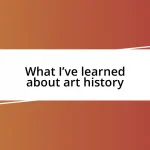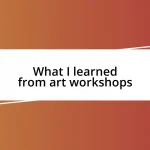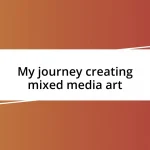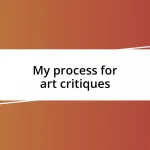Key takeaways:
- Author interviews reveal personal insights and emotional connections, enhancing readers’ engagement with the work.
- Effective interviewing techniques, such as listening attentively and fostering a comfortable environment, lead to richer conversations.
- Building trust and genuine relationships with authors can inspire both personal growth and a deeper understanding of their creative processes.

What are Author Interviews
Author interviews are conversations where the writer shares insights about their work, process, and inspirations. I remember the first time I sat down with a local author over coffee; it felt like peeling away layers of a complex story. What struck me was how these dialogues can reveal not just the book, but the soul behind it.
In my experience, listening to authors speak about their journey often leads to surprising revelations. I once learned that a thriller writer’s plot twist was inspired by a childhood fear. Isn’t it fascinating how our personal experiences shape the stories we tell? These interviews can transform our understanding of a book, turning it into a living dialogue rather than just text on a page.
What makes author interviews so compelling is the intimacy they create. I find myself captivated by the emotions these authors express as they recount their struggles and triumphs. Have you ever felt a deep connection to a character? Author interviews can unravel the threads of those connections and deepen our appreciation for their craft.

Importance of Author Insights
Author insights are incredibly valuable, offering us rare glimpses into the minds of creators. I remember a discussion I had with a poet who explained how an unexpected moment in nature inspired a series of verses. That conversation highlighted for me how life’s trivialities can ignite creativity. Understanding this makes me appreciate not only the final piece of art but the myriad experiences woven into it.
The significance of uncovering these insights can be distilled into a few key points:
- Personal Connection: Learning about an author’s personal journey fosters a deeper emotional tie to their work.
- Creative Process: Insights into their writing process can inspire aspiring writers to explore their unique paths.
- Contextual Understanding: Understanding the context behind a book enriches the reader’s experience and interpretation.
- Diverse Perspectives: Authors often provide insights from their backgrounds, which can broaden our understanding of different cultures and ideas.
- Motivation: Hearing about the challenges authors face can motivate readers and writers alike to persevere in their pursuits.

Key Questions to Ask Authors
When interviewing authors, it’s essential to ask questions that delve deep into their creative processes and motivations. One question I’ve found particularly revealing is, “What inspired the central theme of your book?” This often leads to fascinating stories. For instance, I once spoke with a fantasy author whose world-building was heavily influenced by their childhood adventures in the woods behind their home. Hearing them describe that connection made their narrative come alive for me.
Another engaging question to consider is, “What challenges did you face while writing this book?” Authors often have remarkable personal stories about their struggles with writer’s block or dealing with criticism. In speaking to a memoirist, I learned how they had to confront their past traumas during the writing process, which was both painful and cathartic for them. This insight created a profound respect for their journey and the honesty they brought to their work.
Lastly, asking authors about their favorite characters can yield unexpected insights. I once asked an author who their favorite creation was, and they shared that it was a side character inspired by a close friend. The emotional connection they had with that character transformed an already enjoyable story into something deeply relatable. This not only gives readers a peek into the author’s mind but also enriches our understanding of the narrative.
| Key Question | Purpose |
|---|---|
| What inspired the central theme of your book? | Reveals the author’s core motivations and personal experiences. |
| What challenges did you face while writing this book? | Highlights the author’s journey and the emotional weight behind their work. |
| Who is your favorite character and why? | Provides insight into the author’s personal connections with their creations. |

Techniques for Effective Interviewing
When it comes to effective interviewing, I’ve found the importance of listening cannot be overstated. There was a time when I was wrapped up in my own questions during an interview, and I missed a brilliant, spontaneous thought from the author. That experience taught me to truly tune in; it’s amazing how much richer the conversation becomes when you allow their words to guide the discussion. Are we really listening, or are we just waiting for our turn to speak?
Another technique I swear by is creating a comfortable environment for the author. I remember interviewing a novelist in a quaint café, where the aroma of coffee and the soft buzz of conversations made the chat feel relaxed and natural. This setting encouraged them to share stories without the pressure of a formal backdrop. Don’t underestimate the power of ambiance in fostering openness; it can transform a simple interview into an engaging exchange of ideas.
Finally, being open to follow-up questions has been a game changer for me. One time, while discussing an author’s influences, I allowed my curiosity to take the wheel and ventured off-script. I discovered a personal anecdote about how a fateful encounter at a literature festival shaped their writing. This deeper dive not only unveiled layers of their personality but also added a richness to the interview that I hadn’t anticipated. Isn’t that the beauty of conversation—where one question can lead to unexpected insights?

Analyzing Author Responses
When I analyze author responses, I often look for emotional undercurrents in their stories. For example, I once interviewed a historical fiction writer who spoke about the intense responsibility they felt in portraying real events. Their passion echoed through every word, revealing how deeply they cared about honoring the past. It reminded me of how our own emotions can enrich our storytelling and connect us with readers on a profound level.
Sometimes, an author’s choice of words can reveal their mindset more than the content itself. During a chat with a poet, I observed them carefully selecting phrases, often stumbling over the weight of their own thoughts. This taught me that the intricacies of language reflect not just beauty, but the vulnerabilities of the author. Have you ever noticed how certain sentences linger in your mind, leaving you pondering their depth long after the conversation?
I’ve also found that the context behind an author’s responses is critical for full comprehension. One novelist shared a throwaway line about losing a loved one, which initially seemed incidental. Yet, understanding that this loss profoundly shaped both their characters and narratives illuminated the connection between life experience and creative expression. It’s fascinating how a simple question can unlock a treasure trove of insights, making every interview a unique journey into someone else’s world.

Applying Lessons Learned to Writing
As I’ve applied the lessons I’ve learned from author interviews to my own writing, I’ve discovered the value of emotional honesty. I recall a moment during a live panel discussion where an author touched on vulnerability as a key element in connecting with readers. This sparked a realization for me: when I weave my own emotional experiences into my narratives, the stories resonate more meaningfully. Wouldn’t you agree that the most impactful stories often stem from raw, unfiltered emotions?
Reflecting on narrative techniques has also been a game changer for me. A conversation with a graphic novelist once revealed how he used visual storytelling as a means to convey complex emotions without relying solely on words. Inspired, I started experimenting with imagery and symbolism in my writing. It made me wonder—how can you use visual elements to enhance your own storytelling, regardless of the medium?
Moreover, I’ve learned to embrace the unexpected moments in writing. Just like during one interview where a casual remark led to a deep dive on the author’s writing process, I’ve started allowing my characters to lead the narrative. I’ve often found that the most genuine and engaging plot twists come from moments I didn’t plan. Have you ever followed a character’s intuition and allowed it to guide your story? It can lead to some fascinating places!

Building Relationships with Authors
When I think about the relationships I’ve built with authors, I can’t help but recall several moments that made those connections so meaningful. For instance, during one interview, an author shared a story about their writing mentor, who encouraged them to take creative risks. This made me realize how pivotal these relationships can be in shaping not just an author’s career, but also their emotional resilience. Have you ever had someone in your life who pushed you to step outside your comfort zone?
Engagement goes both ways, and I often find that authors appreciate genuine curiosity. There was a time when I asked an author about their writing routine, and instead of a simple answer, I received an engaging discussion about the importance of community and support among fellow writers. This interaction reinforced my belief that nurturing relationships isn’t just beneficial for gaining insights—it’s about creating a network that fosters growth and sharing. Isn’t it fascinating how a simple question can spark such rich conversations?
Trust forms the bedrock of these connections. I remember an author opening up to me about their struggle with self-doubt while working on their latest book. Sharing such vulnerabilities not only solidified our relationship but also inspired me to approach my own writing with greater authenticity. In those moments, I truly understood that when we create a safe space for dialogue, we allow deeper insights to flow. How often do you feel comfortable enough to share your own struggles in creative pursuits? It’s through these discussions that we build lasting connections.














